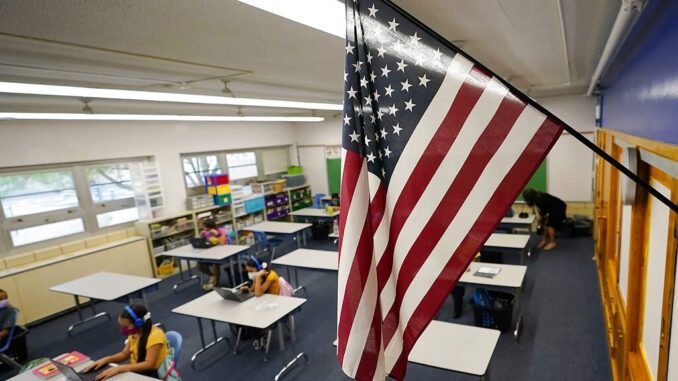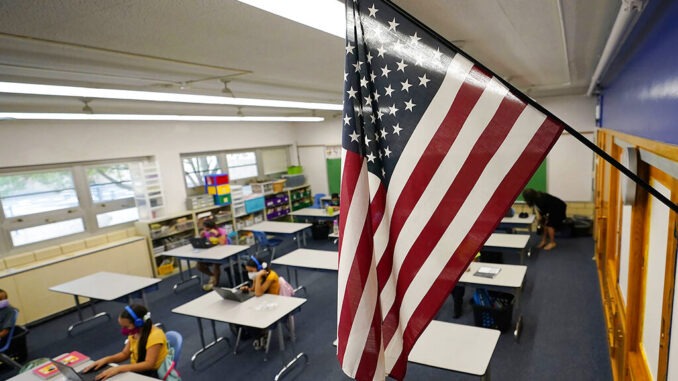

RALEIGH — When the coronavirus hit North Carolina and Gov. Roy Cooper announced his statewide stay-at-home orders, one of the first casualties was public school students, and that has not really changed nine months later, heading into 2021.
Early on, it became clear there was no continuity of education plans in place either at the state, local or school level for a disruption of instructions. Parents quickly found out what their districts could and could not do and what their children were and were not learning.
The struggles in the last half of the 2019-20 school year were felt by every age student and their parents alike. Many children were unable to focus online or follow the often-changing ways lessons were assigned. Parents found themselves juggling working from home and having to monitor the attempt at online classes from their children. Work schedules clashed with class schedules, connectivity and device access, and the increasing amount of screen time took a toll on all involved. Teachers were equally frustrated by having to navigate teaching in a virtual environment with few resources and, in most cases, little to no training.
Relief from those struggles did not come with the new fall semester. Two weeks after his own announcement deadline, Cooper said schools could reopen under Plan B, a hybrid of in-person and remote instruction, but he also left the door open for the districts to choose Plan C, full remote instruction.
With districts essentially allowed to choose which plan they would operate under, the chaos from spring returned, and along with it came no relief for special needs students, who saw a lack of daily participation and plummeting grades.
Students with special needs who have Individualized Education Plans (IEPs) were hit especially hard by school closures. The kind of hands-on instruction and various therapies these students need simply cannot be delivered over a laptop, so upset parents watched as their children regressed.
Near the end of July, parents of special needs students banded together, filing a civil class action suit which named almost every state and federal education agency in the country, including over 100 of the public school districts in North Carolina. Plaintiffs in the class action suit are seeking an injunction prompting an immediate reopening of schools to students with disabilities or a “Pendency Voucher” for educational services and related care programs. The suit, filed in the United States District Court for the Southern District of New York, alleges that the educational rights of their children were violated under the U.S. Constitution, the Individuals with Disabilities Education Act (“IDEA”), Section 504 of the Rehabilitation Act, and Title II of the Americans with Disabilities Act.
Few elected officials consistently questioned school reopening decisions. Lt. Gov. Dan Forest criticized Cooper’s reopening stance and openly questioned the State Board of Education’s failure to advocate for students to return to full in-person instruction under Plan A.
By mid-September legislative leaders and a coalition of parents joined Forest in criticizing Cooper for allowing schools to operate under any plan other than Plan A, full in-person instruction. Senate Leader Phil Berger (R-Eden) said at the time, “Gov. Cooper created this mess, and he needs to fix it,” and warned that “virtual learning is a slow-motion train wreck” which will have a dire impact on student learning and achievement.
That same month, lawmakers passed House Bill 1105, titled the Coronavirus Relief Act 3.0. The bill contained $115 million for education, including $6.5 million to expand choices for families at a critical time by eliminating waitlists for the Children with Disabilities Grant Program and the Education Savings Account Program.
Rep. Craig Horn (R-Union), chair for the House Education K-12 and Education Appropriations committees, said COVID-19 is likely creating a new paradigm shift in education.
“There’s a lot on the plate for the new General Assembly,” Horn said.
Horn, who is retiring this year also co-chaired the education working group for the House Select Committee for COVID-19. Related to the work that committee did, Horn said education funding will need to be tackled in the new session.
“We’re going to have to revisit how we fund education,” said Horn. “We can’t continue to fund education based on attendance or ADM [Average Daily Membership]. That just doesn’t work in a virtual environment.”
State data on enrollment for the second month of public school showed the statewide average daily membership (ADM) number fell by over 27,000 students. Compared to last year at the same point, enrollment dropped by 50,000 students, a dip of 3.6%.
Kindergarten saw the biggest enrollment declines nationwide. The most recent data shows over 13,300 expected NC kindergartners were not enrolled. Some have speculated that a portion of parents may have held their kindergarten-aged children out this year, an act often referred to as “red-shirting.”
While public schools saw stiff declines in enrollment, the state’s public charter schools saw the opposite. By the end of the second month, charter school enrollment grew by 8,424 students. Additionally, homeschooling enrollment exploded, nearly tripling over the previous year. 10,281 Notice of Intent (NOI) filings were made just between July 1 and Aug. 24 versus 3,529 in 2019.
Horn also wondered who will be “looking over the next hill” in education. Senate Education Committee Chair Sen. Deanna Ballard (R-Watagua) is one of the legislators looking over that next hill. Ballard said legislators will likely look to build on programs already out there, including expanding school choice.
“We’re going to continue to push,” said Ballard regarding getting kids back into the classroom. “We also need the education community to step up and say we’re ready to be in the classroom.”
Ballard said she’s heard more from parents this year than she has in the last nine years. She also said she heard a lot from teachers who were adamant about getting back in the classroom but felt they can’t say anything publicly because other teachers are going to shame them.
Ballard referenced the alarming information presented by N.C. Department of Public Instruction’s deputy superintendent of innovation Dr. David Stegall, who told lawmakers that due to the interruptions in instruction this year, that there would be “learning gaps.” He said it could take years for some students to recover and likely a large number of students would need to repeat a grade.
“Stegall said that if we’ve learned anything, ‘choice is vital to families,’” said Ballard. “And he’s thinking choice A, B, or C [reopening] plan. And I’m sitting there thinking choice is a broad word. Choice means where can I get my kid the most optimal instruction for him?”
Stegall also reported that around 18% of districts were still operating under Plan C, fully remote instruction. Of the 59% of N.C. students learning in-person, an alarming 19% were missing “at least two days a week.”
“Our kids have already lost a full year of education growth. They are about to lose a second year of education growth,” Horn said, noting the state will be graduating thousands of students unprepared for college, the military and careers.
Horn didn’t blame teachers, who he said were working very hard during the pandemic, but stated it was clear “we are not moving the needle for kids.” Ballard also applauded teachers, saying that they’ve had to “pivot this year like they’ve never had to pivot before.”
Ballard believes incoming state Superintendent Catherine Truitt will bring the necessary skills to help move students forward, and Horn said he thinks Truitt is going to be “student focused.”
“When considering learning lost due to COVID-19, we must look at where we were as a state prior to school closures and remote learning: 67% of 8th graders were not reading nor doing math proficiently heading into high school,” Truitt said. “So, for me, any Learning Recovery Plan must focus on the basics.”
While on the campaign trail, Truitt often spoke of launching a statewide reading initiative that would include school and parents. She said that there are many groups in the state working on how to shift resources from tutoring struggling students to equipping teachers and principals with a new tool kit grounded in the science of reading.
“The State Board and I are going to bring these groups together in February, so we can all row in the same direction on behalf of students,” said Truitt. “I’m also looking at tools for teachers that will leverage competency-based education to provide rapid diagnostic testing in math so that teachers can know immediately what their student last knew and could do, and tailor instruction from there.”



